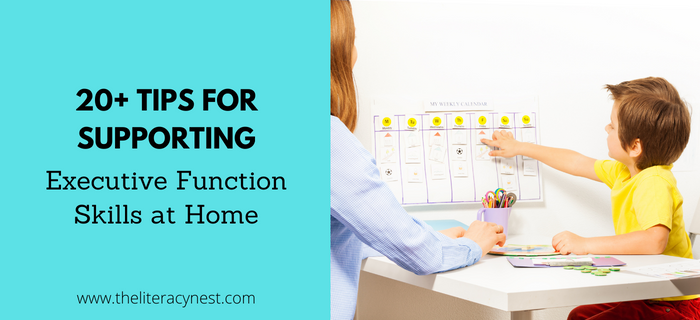Share:
(This post contains affiliate links.)
Hello everyone! As a teacher working with children with dyslexia, I grow a special bond with each child I work with as the years pass. It’s a unique relationship when you use the Orton-Gillingham approach. I learn a great deal about each child through the teacher lens, but it’s the parents who can reveal what it is truly like to advocate and seek the right kind of help to raise a thriving learner. For many parents of children with dyslexia, it’s a constant, uphill battle.
When I met Ali from Testing My Metal, I knew she could help me, as well as all of you, gain some perspective on raising dyslexic children. I’m thrilled to have her as a guest blogger today. Ali is the mother of four. She often finds herself finding treasure, and sometimes humor, in the trials of life. Please welcome her! If you found this post helpful, please comment below and be sure to visit her blog, Testing My Metal.
5 Steps You Should Take to Help Your Dyslexic Child Thrive
When my daughter was first identified as Dyslexic, I felt like I could breathe again. She was in second grade and we finally had the answer! The answer to why she never liked school and it was so incredibly hard to get her up and out the door in the mornings. The answer to why she always complained of stomach aches and headaches. The answer to why she couldn’t read and barely could remember the sounds of the letters of the alphabet. Then, as I started to let things sink in, my relief turned into feeling overwhelmed. As I began my research about Dyslexia, I found some life-saving resources. I started to realize that although this journey would not be easy, it would greatly enhance the quality of life for my sweet daughter.
Maybe you just found out your child is Dyslexic. Or maybe your child has been identified for some time now. Either way, all parents of dyslexic children would be wise to concentrate on these 5 steps to help your Dyslexic child to thrive!
1. Read these two books:
–Overcoming Dyslexia: A New and Complete Science-Based Program for Reading Problems at Any Level by Dr. Sally Shaywitz
Dr. Shaywitz is a neuroscientist and a professor of pediatrics at Yale and a leader in research for how the dyslexic brain works. She is also the co-director of the Yale Center for the Study of Learning and Attention. My daughter’s Dyslexia Intervention teacher refers to this book as her “bible” for Dyslexia information.
–The Dyslexia Advantage: Unlocking the Hidden Potential of the Dyslexic Brain by Brock L. Eide, M.D.A. and Fernette F. Eide, M.D.
Both of the coauthors are international authorities on dyslexia and learning differences. They have founded Dyslexic Advantage, a 501(c)3 charitable organization. Their mission, as stated on their website, is to revolutionize the way dyslexia is regarded.
I can’t emphasize this enough! Your starting point should be here. Both books are available with an Audible version through Amazon. The Dyslexic Advantage website is a wealth of information and a wonderful community that I highly recommend you join!
2. Make sure your child’s teacher(s) know certain key information for helping your dyslexic child.
Your child’s teacher(s), however well meaning, will probably have the same misconceptions about Dyslexia that are prevalent in the general population. Having a dyslexic child in their class does add a different dimension to their teaching that can often be seen as a burden. But, it doesn’t mean they have to work harder; they just have to work smarter. Many of the techniques and approaches which benefit students in the classroom who have dyslexia will also enrich the education of the other students in the classroom. And you, the parent, can help them gain an authentic understanding of what a dyslexic student needs. Our general education elementary teachers, especially Kindergarten and First Grade teachers, are often times our first line of defense in detecting and teaching our dyslexic kids. Providing them with essential research and resources will not only improve the classroom experience for your child, but also for any other dyslexic students this teacher may have going forward in their teaching career. ProfessorGarfield.org (formerly Sparktop.org), has a wonderful Teacher Resource Center.
For a list of things your child’s teacher(s) should be made aware of, click here.
3. Teach your child how his/her brain works differently and the advantages of having a dyslexic brain
A dyslexic brain does not have a defect. It processes information differently which causes certain challenges and but also renders certain strengths that are less common in non-dyslexic brains.
The route in which information takes from one part of the brain to the other differs in a dyslexic brain. The main route (or express highway) is blocked and the information has to take a different, bumpier, more scenic route along the back roads. This causes a delay in time that a dyslexic brain can process information.
ProfessorGarfield.org is a great resource for helping kids with dyslexia understand how their brains work.
The very ways in which their brains are wired differently also means that they excel in particular areas more readily than non -dyslexic people.
From the book, The Dyslexia Advantage, here are some of those areas:
-advanced three-dimensional spatial reasoning and mechanical ability
-the ability to perceive relationships like analogies, metaphors, paradoxes, similarities, differences, implications, gaps, and imbalances
-the ability to remember important personal experiences and to understand abstract information in terms of specific examples
-the ability to perceive and take advantage of subtle patterns in complex and constantly shifting systems or data sets
4. Help Your Child Find and Foster a Special Talent or Interest
One of the most important goals is to preserve your child’s self-esteem. It is important for your child to have an area in his/her life that she excels in and is highly enjoyable. Although learning to overcome challenges in the classroom is a major part of their lives, time should be set aside to explore, grow, and refine skills in a talent or hobby.
5. Be A Relentless Advocate
I am fortunate that my daughter’s school has a specially trained Dyslexia teacher that pulls each child out of class each day (during a time there is no new material being presented in the child’s classroom) in order to teach them using the Lindamood-Bell program.
Even if your child’s school offers a robust Dyslexia intervention program, educate yourself on the accommodations you should expect the regular classroom teachers to implement. Many educators, just like the general public, are either misinformed or not informed at all. The myths about what Dyslexia is are very prevalent. In fact, I am willing to bet that before your child was diagnosed, you too were only aware of these myths. I know that was very true for myself! Education is empowerment-so to be an empowered advocate for your child, first educate yourself!
Helping your child navigate and thrive in this world is a lifelong mission, a mission that will take great amounts of time, energy, and love. Never give up! Some days you may feel that you could not possibly be any more overwhelmed. And guess what? That is okay. Take a deep breath and carry on knowing there are many fellow parents that are on the same journey. I personally recommend getting in touch and joining your local chapter of the International Dyslexia Association. The resources that are available are phenomenal!
Also, here is a list of the best books, compiled by Dr. Sally Shaywitz of Overcoming Dyslexia, for Dyslexic kids to read.
Share:




Commend each accomplishment with a great job or a high five. Each and every one. Try not to depend on report card grades to be the judge of your understudy's advance. Praise his or her perusing a solitary word effectively. Meet your tyke on his/her perusing level and commend the triumphs at that level. On the off chance that your tyke is a start or for all intents and purposes a non-peruser, commend disentangling "at" or utilizing a photo to comprehend an obscure word. On the off chance that your tyke is starting to peruse all the more fluidly, celebrate when they self-remedy a mistake.
best essay writing service
I understand the struggles that are faced by a dyslexic child. I grew up with dyslexia and I have gone a lot of challenges because of my difficulty. These includes being bullied and making fun of by my classmates. My confidence completely fell down because of that. Luckily today there are a lot of methods that can help dyslexic children treat their conditions. For everyone suffering the same fate, just be strong and don't worry! It can be cured trust me. best paper writing service reviews